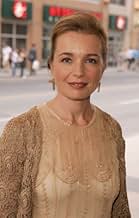Adicionar um enredo no seu idiomaThree female tourists have their eyes opened while visiting the poverty-stricken and dangerous world of 1980s Haiti.Three female tourists have their eyes opened while visiting the poverty-stricken and dangerous world of 1980s Haiti.Three female tourists have their eyes opened while visiting the poverty-stricken and dangerous world of 1980s Haiti.
- Direção
- Roteiristas
- Artistas
- Prêmios
- 3 vitórias e 1 indicação no total
Avaliações em destaque
Three mid-aged North American women (two Americans and one Canadian) went to Haiti for summer vacation in the 70s, soaking in the sun and their desire for beautiful young Haitian boys. They have what those boys don't have: money and social status. The boys have what the ladies don't have: their youth and bodies. When two of the three ladies want the same handsome 18 years old Legba, the vacation is over.
This is an excellent film. I love this film for its brutal honesty, its originality, its thought provoking subject, and its terrific performance. Money liberates these ladies' sexuality, but can money buy love that they really desire for? Isn't it interesting that these ladies wouldn't lay their eyes on a black guy back home, but they are lusting after these young men in the poorest country? What made the connection between them here in Haiti?
Proceedings are a little slow, the director Laurent Cantent being addicted to long, static shots, and there is not much in the way of erotic scenes. The resort is not a luxury one, these are not wealthy guests, but the women can buy what they want here. Ellen, the Queen Bee, is outwardly unsentimental about it all but she too becomes emotionally involved with her beach boy. Charlotte Rampling, the vixen for all seasons, plays Ellen with both sensitivity and panache, while Karen Young does a wonderfully self-centred Rachel. She falls in love with the charming Legba (Menthony Cesar), with whom she experienced her first orgasm, at the age of 45, but of course it is a hopeless passion.
I came out with mixed feelings about this film's message. One the one hand, the women are exploiting the young Haitian men, on the other the women are vulnerable and lonely, and non-violent. I'm not at all sure that either side is damaged by the contact, and one of the relationships, between the French Canadian Sue (Louise Portal) and her rather older "boy" seems to be a perfectly healthy one with no illusions on either side. Obviously there are risks for the women (falling in love with the gigolo seems to be the major one) but are they not entitled to some emotional adventure even in staid middle age?
Charlotte Rampling as Ellen has relatively few scenes, but leaves a great impression as a college professor whose value in the sexual marketplace shoots up when she leaves Boston for the tropics. She doesn't seem very bitter about this, just accepts it as part of the aging process. Karen Young is new to me, most of her work has been done for TV. Her part is different, more spiritual, less grounded in the realities of here and now. She has less inner resources to cope with the chaos and violence of Haiti. Louise Portal is one of my favorite Quebec actresses, known to foreign viewers through Denis Arcand's very funny Decline of The American Empire. Here she plays a woman who is simpler than Ellen or Brenda, happier and less conflicted about growing old.
Cantet's direction of actors and description of the poverty and desperation, as well as the beauty of the Haitian locales is very effective. I wondered what he was going to do after Time Out, that wintry cry of despair from the French Alps, and he hasn't disappointed me.
The film is well cast. Charlotte Rampling, Karen Young, and Louise Portal well portray the desperation for affection sought by them. Louise Portal as Legba and Lys Ambroise as Albert are excellent as the other side of this perverted fantasy.
Highly recommended.
Cantet and cinematographer Pierre Milon have shot many incredibly complex emotional exchanges without relying on any obvious dialogue. Their confidence that it would cut together and 'play' so well on screen must be partially due to Cantet's having a co-writer who is also the editor (Robin Campillo). The story is told through subtle reactions, gestures and intonations ala "Time Out," but Vers's dialogue seems both more plentiful and more emotionally transparent.
"Vers" also contains more characters, incidents, and a more complex thematic scope than "Time Out." Where "Time" explored a single character's relation to work, pride, and masculinity, "Vers" explores 3 middle-aged white women's sexual and romantic desire for a teenage Haitian, black male prostitute. Cantet explores the central situation's inherent political, racial, sexual, emotional and age-related issues-- often in the same scene.
In doing so, Cantet / LaFerriere necessarily broach a number of taboo subjects: middle age women being openly sexual on screen, and being sexual with teenagers; women paying male prostitutes; white women with black men; women as one discarded, ignored caste, hooking up with another discarded, ignored caste (3rd world men of color); women giving sexual desire the same primacy in their lives as men traditionally have; the world's richest bedding the world's poorest; the willful blindness of the rich towards the suffering of the poor or foreign; American economic imperialism; the predatory nature of consumerist tourism.
In exploring these issues, Vers provokes a sense of moral/political outrage on par with the very angry, very moving "The Constant Gardener." The tourist women of "Vers" turn a willfully blind eye to the dire political / economic situation that drives vulnerable young men into their beds. To watch these women do this is infuriating; their desire becomes repellent, exploitative.
But at the same moment, we are also made to feel how touchingly human these women's needs are-- for love (Brenda), sex (Ellen) and affection (Sue). We experience their loneliness as achingly poignant, even tragic. During the Q&A, one middle-aged woman in the audience referred to the film as pro-feminist in its emotional honesty, and I agree.
The women's relations with their gigolos appear to be emotional two-way streets, albeit with a much wider lane for the Northerners. The women and young men do share affection; and it isn't hard to understand how the women could fool themselves into believing in the possibility of real love blossoming in these tropical, permissive environs.
But when disagreement or insecurity arises with the gigolos, the women's economic superiority gives them the final word. That the same characters in the same scene can simultaneously evoke nausea and tenderness is a testament to the skills of all involved.
The film feels very French in its tasteful restraint -- the sex is never shown -- and in the way it explores its politically charged themes largely through male/female relationships. The film therefore plays entirely as human drama, and never feels sensationalistic, didactic, or titillating.
I had a few *minor* quibbles with this great film. The performances of actors playing Ellen, Albert and Legba were pitch-perfect. But there were moments in Brenda and Sue's scenes when I felt them 'Acting'-- whether this is attributable to lapses in writing, acting, directing or editing is impossible to know. I enjoyed the monologues, delivered into the camera, but I thought they would have felt less artificial if another character had been written into the rooms with them, for the character to address. I also felt it lasted 1 or 2 scenes longer than necessary in the end.
Some have argued that the film should included more of Legba's perspective, but I disagree. Given the sensitivity of the film as a whole, the nationality of the original short story writer (Haitian), and in conveying Legba's emotions in particular, I'm sure that the storytellers made a conscious decision not to include more of Legba's perspective, and the film's structure is the stronger for it.
In fact, the film could only have been created by a group of artists working at the top of their form. Like "Time Out," there will not be a more complex film than Vers Le Sud this year (and I include my other art-house favorites 2046, Head-On, Last Days, Broken Flowers, Brown Bunny, The New World, and yes, Kung Fu Hustle). Here's hoping Vers gets a proper distribution.
Você sabia?
- CuriosidadesPart of the film was to be shot in Haiti but only one week's filming took place because political events prevented the crew from staying longer. The rest of the film was shot in the Dominican Republic, in neighboring Santo Domingo.
- Erros de gravaçãoWhen Brenda is desperately looking for Legba and she wanders around the village at night, one of the guys she crosses by is wearing a Larry Johnson NBA New York Knicks basketball jacket with number 2. Larry Johnson played for the Knicks in the mid '90s.
- Citações
[recalling her first time with Legba]
Brenda: We were both lying in our bathing suits on a big rock, basking in the sun. His body fascinated me. Long, lithe, muscular, his skin glistened. I couldn't take my eyes off him. And the later it got, the more I was losing my mind. He was, he was lying there beside me, his eyes were shut. I remember every move I made, as if it was yesterday. I edged my hand over and placed it on his chest. Legba opened his eyes and immediately closed them again. That encouraged me and I, I moved my hand down his body. Such soft, young skin. He was motionless. And I slid two fingers into his bathing suit and touched his cock. Almost immediately, it started getting hard, growing in the palm of my hand, until it just popped out. His arms were beside his body. He breathed faintly, but, but very regularly. I looked around to see that no one was coming and I threw myself on him. I literally threw myself on him. It, it was so violent, I couldn't help but scream. I, I think I never stopped screaming. It was my first orgasm. I was 45.
- ConexõesEdited into La dérive douce d'un enfant de Petit-Goâve (2009)
- Trilhas sonorasSobo
Traditional
Performed by Ti Koka et Wanga Negès
Principais escolhas
- How long is Heading South?Fornecido pela Alexa
Detalhes
- Data de lançamento
- Países de origem
- Idiomas
- Também conhecido como
- Heading South
- Locações de filme
- Empresas de produção
- Consulte mais créditos da empresa na IMDbPro
Bilheteria
- Faturamento bruto nos EUA e Canadá
- US$ 898.468
- Fim de semana de estreia nos EUA e Canadá
- US$ 1.200
- 5 de fev. de 2006
- Faturamento bruto mundial
- US$ 3.294.052
- Tempo de duração1 hora 48 minutos
- Cor
- Mixagem de som
- Proporção
- 1.85 : 1
Contribua para esta página

























